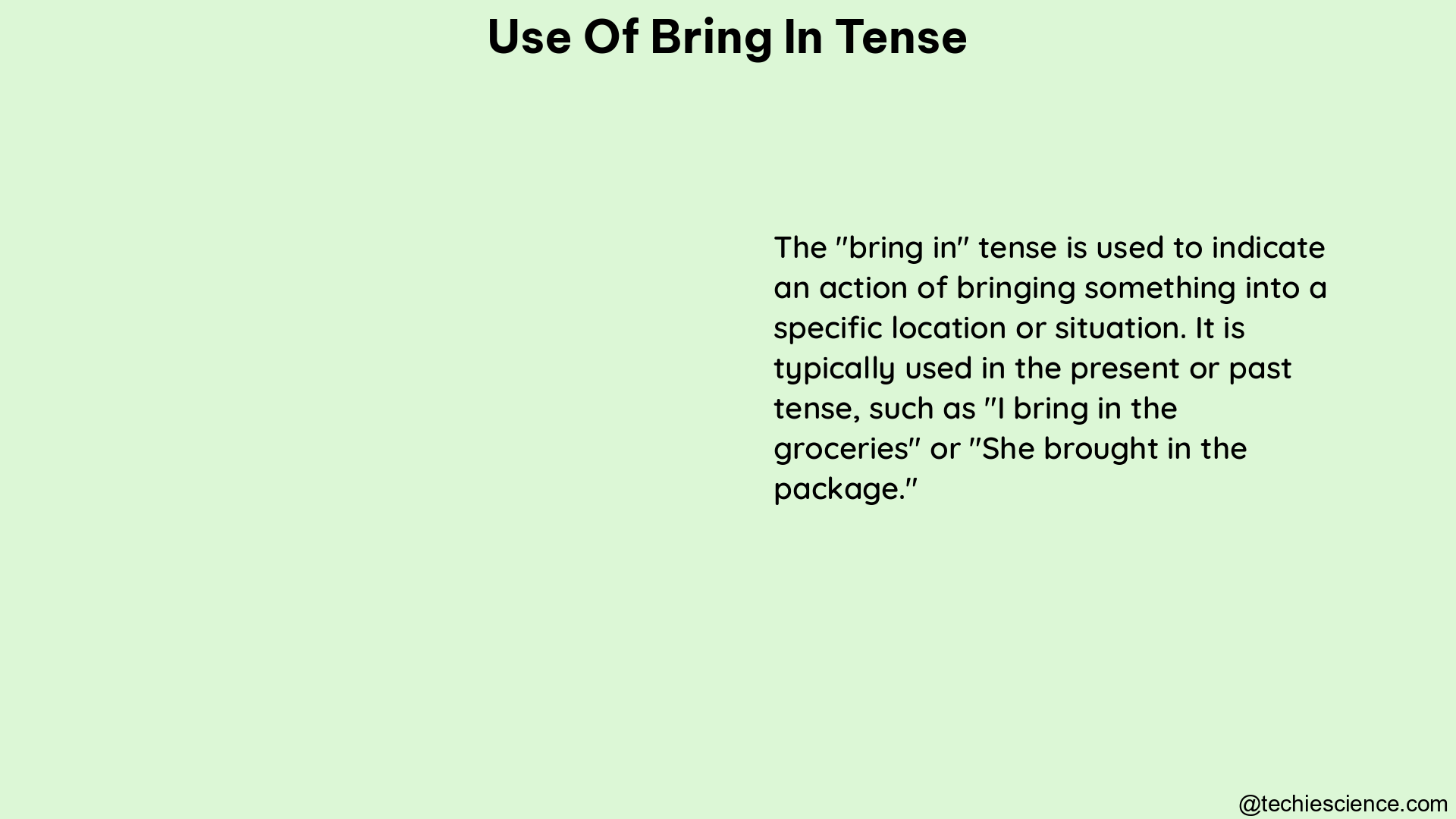The English language is renowned for its complexity, and the verb “bring” is no exception. This versatile word has a unique set of grammatical rules and irregularities that can be challenging for both native and non-native speakers. In this comprehensive guide, we’ll delve into the intricate details of using “bring” in various tenses, equipping you with the knowledge to navigate this linguistic nuance with confidence.
Present Tense
Base Form
The base form of the verb “bring” is, well, “bring.” This is the form used in the present tense when the subject is not in the third person singular.
Example: “I bring my lunch to work every day.”
Third Person Singular
When the subject is in the third person singular (he, she, it), the verb “bring” takes on the form “brings.”
Example: “She brings her own water bottle to the gym.”
Past Tense

Simple Past
The simple past tense of “bring” is “brought.” This is the standard and most commonly used form for expressing past actions or events.
Example: “She brought a cake to the party last night.”
Past Participle
The past participle of “bring” is also “brought.” This form is used in perfect tenses, such as the present perfect and past perfect.
Example: “I have brought my umbrella today, just in case it rains.”
Future Tense
Simple Future
To express future actions or events involving “bring,” the simple future tense is formed by using the auxiliary verb “will” followed by the base form of the verb.
Example: “They will bring their friends to the concert next weekend.”
Future Perfect
The future perfect tense is used to indicate an action that will be completed before a specific future time. It is formed by using the auxiliary verb “will have” followed by the past participle of the verb.
Example: “By the time we arrive, they will have brought all the supplies we need.”
Irregularities and Variations
Strong Verb
“Bring” is considered a strong verb, which means that it undergoes a change in its vowel sound to indicate tense changes. This is in contrast to weak verbs, which typically add “-ed” to the end to form the past tense.
Old English Roots
The past tense form “brought” has its origins in Old English, where the nasal vowel “ã” evolved into the modern “o” sound.
Informal Dialects
In some informal dialects, the past tense form “brang” may be used instead of the standard “brought.” However, this variation is generally considered nonstandard and should be avoided in formal writing.
Additional Considerations
Broughten
While not widely accepted, some regional dialects may use the form “broughten” as a past participle of “bring.” This variation is not considered standard English and should be avoided in formal contexts.
Brang vs. Brung
Both “brang” and “brung” are nonstandard past tense forms of “bring” that may be encountered in informal speech or writing. However, the standard and recommended form is “brought.”
Examples
Present Tense
- “I bring my lunch to work every day.”
- “She brings her own water bottle to the gym.”
Past Tense
- “She brought a cake to the party last night.”
- “I had brought my umbrella, but it didn’t rain.”
Future Tense
- “They will bring their friends to the concert next weekend.”
- “By the time we arrive, they will have brought all the supplies we need.”
Key Takeaways
- The base form of the verb “bring” is “bring,” and the third person singular form is “brings.”
- The simple past tense and past participle of “bring” is “brought.”
- The simple future tense is formed with “will bring,” and the future perfect tense is “will have brought.”
- “Bring” is a strong verb, meaning it undergoes vowel changes to indicate tense.
- The past tense form “brought” has roots in Old English.
- Nonstandard forms like “brang” and “brung” may be encountered in informal contexts but should be avoided in formal writing.
By mastering the intricacies of using “bring” in different tenses, you’ll be able to communicate more effectively and confidently in both written and spoken English. Remember, practice makes perfect, so keep these guidelines in mind as you navigate the complexities of the English language.
References
- Why is the past tense of “bring” the word “brought”?
- Bring, Take, and Fetch
- Usage of “brang” vs. “brung” vs. “brought”

Hi…. I am Goutam Datta. I have completed a double M. A. in English and B. Ed. I am a creative writer. Currently, I am a part of the LambdaGeeks.